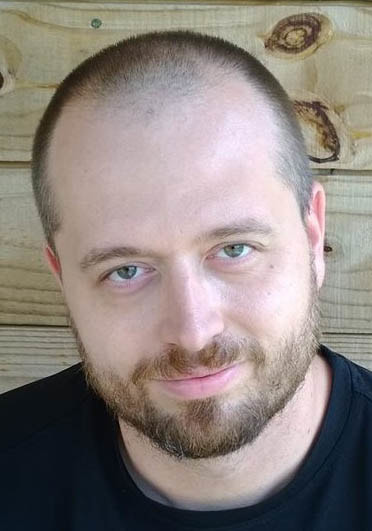Please Share
SINdrome
The
New Lyons Sequence #3
New Lyons Sequence #3
by
J.T. Nicholas
J.T. Nicholas
Genre: Science Fiction, Artificial Intelligence
Pub
Date: 9/18/18
Date: 9/18/18
The
Sickness unto Death
Sickness unto Death
The
Synth revolution has come at last. The supposedly synthetic beingshumans crafted to do their dirty work for them have fully actualized
their own humanity—and they no longer acquiesce in their
enslavement. Victory in the struggle to tear down the institutions of
oppression seems just a matter of time. But the halls of power are
not so easily shaken—and a counterstrike is inevitable.
Synth revolution has come at last. The supposedly synthetic beingshumans crafted to do their dirty work for them have fully actualized
their own humanity—and they no longer acquiesce in their
enslavement. Victory in the struggle to tear down the institutions of
oppression seems just a matter of time. But the halls of power are
not so easily shaken—and a counterstrike is inevitable.
Former
Detective Jason Campbell has pledged his life to the Synthetic cause.
So when a mysterious virus starts wiping out Synths left and
right—and shows signs of mutating to target everyone else—he must
lead a race against time to prevent the outbreak of the most horrific
plague the world has ever seen. If he succeeds, he’ll expose the
moral bankruptcy of the depraved elites who will stop at nothing to
restore the old order. If he fails, it could mean the end of life on
this planet. For both Synth and Human.
Detective Jason Campbell has pledged his life to the Synthetic cause.
So when a mysterious virus starts wiping out Synths left and
right—and shows signs of mutating to target everyone else—he must
lead a race against time to prevent the outbreak of the most horrific
plague the world has ever seen. If he succeeds, he’ll expose the
moral bankruptcy of the depraved elites who will stop at nothing to
restore the old order. If he fails, it could mean the end of life on
this planet. For both Synth and Human.
SINdicate
The
New Lyons Sequence #2
New Lyons Sequence #2
The
Post-Modern Prometheus
Post-Modern Prometheus
Synths
were manufactured to look human and perform physical labor, but they
were still only machines. That’s what the people who used—and
abused—them believed, until the truth was revealed: Synths are
independent, sentient beings. Now, the governments of the world must
either recognize their human nature and grant them their rightful
freedom, or brace for a revolution.
were manufactured to look human and perform physical labor, but they
were still only machines. That’s what the people who used—and
abused—them believed, until the truth was revealed: Synths are
independent, sentient beings. Now, the governments of the world must
either recognize their human nature and grant them their rightful
freedom, or brace for a revolution.
Former
New Lyons Detective Jason Campbell has committed himself to the
Synths’ cause, willing to fight every army the human race marches
against them. But they have an even greater enemy in Walton
Biogenics, the syndicate behind the creation and distribution of the
“artificial” humans. The company will stop at nothing to protect
their secrets—and the near-mythological figure known to Synths as
“The First,” whose very existence threatens the balance of power
across the world . . .
New Lyons Detective Jason Campbell has committed himself to the
Synths’ cause, willing to fight every army the human race marches
against them. But they have an even greater enemy in Walton
Biogenics, the syndicate behind the creation and distribution of the
“artificial” humans. The company will stop at nothing to protect
their secrets—and the near-mythological figure known to Synths as
“The First,” whose very existence threatens the balance of power
across the world . . .
SINthetic
The
New Lyons Sequence #1
New Lyons Sequence #1
The
Artificial Evolution
Artificial Evolution
They
look like us. Act like us. But they are not human. Created to
perform the menial tasks real humans detest, Synths were designed
with only a basic intelligence and minimal emotional response. It
stands to reason that they have no rights. Like any technology, they
are designed for human convenience. Disposable.
look like us. Act like us. But they are not human. Created to
perform the menial tasks real humans detest, Synths were designed
with only a basic intelligence and minimal emotional response. It
stands to reason that they have no rights. Like any technology, they
are designed for human convenience. Disposable.
In
the city of New Lyons, Detective Jason Campbell is investigating a
vicious crime: a female body found mutilated and left in the streets.
Once the victim is identified as a Synth, the crime is designated no
more than the destruction of property, and Campbell is pulled from
the case.
the city of New Lyons, Detective Jason Campbell is investigating a
vicious crime: a female body found mutilated and left in the streets.
Once the victim is identified as a Synth, the crime is designated no
more than the destruction of property, and Campbell is pulled from
the case.
But
when a mysterious stranger approaches Campbell and asks him to
continue his investigation in secret, Campbell is dragged into a dark
world of unimaginable corruption. One that leaves him questioning the
true nature of humanity.
when a mysterious stranger approaches Campbell and asks him to
continue his investigation in secret, Campbell is dragged into a dark
world of unimaginable corruption. One that leaves him questioning the
true nature of humanity.
And
what he discovers is only the beginning . . .
what he discovers is only the beginning . . .
J.T.
Nicholas was born in Lexington,
Virginia, though within six months he moved (or was moved, rather) to
Stuttgart, Germany. Thus began the long journey of the military brat,
hopping from state to state and country to country until, at present,
he has accumulated nearly thirty relocations. This experience taught
him that, regardless of where one found oneself, people were largely
the same. When not writing, Nick spends his time practicing a variety
of martial arts, playing games (video, tabletop, and otherwise), and
reading everything he can get his hands on. Nick currently resides in
Louisville, Kentucky, with his wife, a pair of indifferent cats, a
neurotic Papillion, and an Australian Shepherd who (rightly) believes
he is in charge of the day-to-day affairs.
Nicholas was born in Lexington,
Virginia, though within six months he moved (or was moved, rather) to
Stuttgart, Germany. Thus began the long journey of the military brat,
hopping from state to state and country to country until, at present,
he has accumulated nearly thirty relocations. This experience taught
him that, regardless of where one found oneself, people were largely
the same. When not writing, Nick spends his time practicing a variety
of martial arts, playing games (video, tabletop, and otherwise), and
reading everything he can get his hands on. Nick currently resides in
Louisville, Kentucky, with his wife, a pair of indifferent cats, a
neurotic Papillion, and an Australian Shepherd who (rightly) believes
he is in charge of the day-to-day affairs.

There was a body on my doorstep.
I don’t know what woke me, or what drove me to climb so early from the narrow cot that served as my bed.
Maybe it was some lingering cop instinct from my time with the NLPD, that nagging sense that something
was wrong. It was that instinct that had me tucking the paddle holster of my forty-five into the waistband of
the ratty jeans I had fallen asleep in.
I slid open the door of the eight-by-eight walled office cubicle that served as my bedroom and stepped out
onto the cavernous floor of what had once been a call center. The first rays of dawn were peeking over the
eastern horizon, filtering through what remained of the call center’s windows, casting the interior in
monochromatic grays accented with darker pools of shadow.
The broad floor was filled with sleeping people. Sleeping synthetics. The genetically engineered clones that
had served as an underclass of slave labor for decades and, with a small amount of help from me and a
whole lot of work and planning from a synthetic named Silas, had begun a de facto rebellion.
I padded among them on bare feet, stepping as silently as possible, and yet, without exception, the eyes of
each synthetic I passed popped open. They stared at me, stark-white against the gray, eyes wide,
searching, and somehow fearful. Not one of them moved. They waited in statue-like rigidity, a coiled-spring
tension resonating from their stillness. It lasted only a moment, until they realized where they were; until
they realized who I was. I couldn’t begrudge them that moment of fear, but it still hit me like a punch to the
gut.
Such was life in revolution central. Nearly a month since we had taken over the air and net waves. Nearly a
month since we had ripped off the veil covering the ugly truth that synthetics were not unthinking, unfeeling
things, but as much people as any of the naturally born. Nearly a month, and for synthetics, things had
gotten worse.
Much worse.
It wasn’t unexpected. Silas had predicted the reaction from society at large when we shone a spotlight on
the truth that everyone suspected but no one seemed willing to admit. It had started with protests. Angry
people marching with signs about respecting their rights and not dictating what they could do with their
bought-and-paid-for property. The protests should have collapsed under the weight of irony alone, but
instead they had given way to violence—violence directed almost entirely against synthetics. Viral videos of
synthetic beatings—always popular—had hit unprecedented highs, as had videos depicting darker, more
depraved “punishments” for those who dared to think they might one day be “real” people. The violence, in
turn, had given way to death. Not on a widespread scale—not yet. Whatever else they might be, synthetics
were, after all, expensive. Only the very wealthy could afford to dispose of them wantonly.
We’d given the world an ultimatum: give synthetics rights, or be prepared to have all the little secrets that
they had gathered in their decades of near-invisible servitude released to the public. Silas had managed to
bring together and weaponize secrets that could topple governments and destroy lives. The plan was
simple enough—release a wave of compromising information on a number of politicians and public figures.
The first wave was embarrassing, but not damning, not actively criminal. If that failed to spark action, then a
second, more catastrophic wave would be released. And so on, until the governments either acceded to
our demands or toppled from the sheer weight of skeletons tumbling out of closets.
But as that deadline crept closer—now just over a week away—the bodies were beginning to pile up. The
richest among society—individuals and corporations alike—could afford to throw away a synthetic here, a
synthetic there, and as the dawn of revolution approached, they made their position clear. One billionaire
businessman had gone so far as to cobble together a reality livestream. Every day, contestants undertook
a series of challenges, and the winner got to kill a synthetic in any way they chose, all during a livestream
that, last I checked, had viewership measured in
the millions.
And yet, there was hope out there.
That hope was part of the reason the floor I moved across was filled with synthetics, crowded in here and
there in clusters amidst the cavernous call center. They would trickle in by ones and twos, somehow always
finding us, despite our having changed locations four times in the past month. Most told the same
story—their nominal owners, horrified by the revelation that they had, in essence, been keeping slaves, but
terrified of the possible reprisals from those who thought differently, had simply set them free. Turned them
out. Part kindness, part assuaging of guilt…and part washing your hands of a problem you wanted no part
of.
I didn’t know how they found us. They trusted me enough to share some pieces of their stories. The part I
played in the rescue of Evelyn, what I had sacrificed to get the truth out, had earned me that much.That didn’t stop a young synthetic girl, maybe seventeen, from rolling into a half crouch as I neared. Her
hands were extended in front of her, a gesture half defense, half supplication. Her look of horror and shame
and guilt and fear reminded me so suddenly and sharply of Annabelle that it was like a knife twisting in my
intestines. Her mouth opened and formed a single word, not spoken, but clear as a gunshot nonetheless.
“No.”
What could I do? I wasn’t the one who had hurt her, but she’d been hurt, badly. I offered a smile and kept
my distance. It took a moment for the recognition to dawn, for the panic to quiet. Quiet, but not fall silent. I
was still an outsider. I belonged to a different class, a class that had long subjugated and tormented them.
A human. Trust only extended so
far. But I had my suspicions as to how they found me, and my suspicions had a name.
Silas.
The albino synthetic who had started my feet on this path remained elusive. We received messages from
him on a regular basis, and he made brief appearances a couple of times a week, mostly to check in on
Evelyn and make sure she was receiving the medical care she needed so late in her pregnancy. But after
only a short visit, he would vanish with the ease that had made him so damn hard to track down in the first
place. He, or rather his messages, told us when to move, and where to move. That let us know when my
former brothers and sisters in blue were getting too
close. I had no doubt that it was his network that funneled the turned-out synthetics to our door.
I just didn’t know what in the hell he expected me to do with them.
Whatever Silas might hope—whatever I might hope—when February 1 rolled around, the governments of
the world would not simply roll over, pass some new laws, sprinkle a shit-ton of fairy dust, and declare that
synthetics were now all full-fledged citizens. And by the way, sorry about all the assaults, rapes, and
murders suffered in the interim. No. The months ahead would be steeped in blood.
And not one of the synthetics that were beginning to stir with the rising sun would be able to spill a single
drop of it. Call it conditioning.
Call it brainwashing, but synthetics were engineered to be incapable of violence, even in self-defense.
Which was going to make fighting a war pretty fucking hard.
I had nearly reached the main door of the call center. The entire front of the building—once a shining wall of
steel and glass—had been boarded up, long sheets of plywood secured to the frame. Thin cracks of light
filtered in where the boards fit imperfectly, and more came from openings higher up, where other windows
had been spared the fortification. I had moved through that fractured light, my unease growing with each
step. I dropped my hand to the butt of my pistol, thumb finding the retention lock and easing it forward.
A four-by-four rested in a pair of brackets across the door, barring it more effectively than any lock. I had
eased it off with my left hand, straining slightly with the effort, and lowered it to the floor. I had pulled the
door open, reflexively scanning left and right, searching for threats. Nothing.
The tension I’d felt since awakening had started to ease.
Until I had looked down.
And saw the body.
I don’t know what woke me, or what drove me to climb so early from the narrow cot that served as my bed.
Maybe it was some lingering cop instinct from my time with the NLPD, that nagging sense that something
was wrong. It was that instinct that had me tucking the paddle holster of my forty-five into the waistband of
the ratty jeans I had fallen asleep in.
I slid open the door of the eight-by-eight walled office cubicle that served as my bedroom and stepped out
onto the cavernous floor of what had once been a call center. The first rays of dawn were peeking over the
eastern horizon, filtering through what remained of the call center’s windows, casting the interior in
monochromatic grays accented with darker pools of shadow.
The broad floor was filled with sleeping people. Sleeping synthetics. The genetically engineered clones that
had served as an underclass of slave labor for decades and, with a small amount of help from me and a
whole lot of work and planning from a synthetic named Silas, had begun a de facto rebellion.
I padded among them on bare feet, stepping as silently as possible, and yet, without exception, the eyes of
each synthetic I passed popped open. They stared at me, stark-white against the gray, eyes wide,
searching, and somehow fearful. Not one of them moved. They waited in statue-like rigidity, a coiled-spring
tension resonating from their stillness. It lasted only a moment, until they realized where they were; until
they realized who I was. I couldn’t begrudge them that moment of fear, but it still hit me like a punch to the
gut.
Such was life in revolution central. Nearly a month since we had taken over the air and net waves. Nearly a
month since we had ripped off the veil covering the ugly truth that synthetics were not unthinking, unfeeling
things, but as much people as any of the naturally born. Nearly a month, and for synthetics, things had
gotten worse.
Much worse.
It wasn’t unexpected. Silas had predicted the reaction from society at large when we shone a spotlight on
the truth that everyone suspected but no one seemed willing to admit. It had started with protests. Angry
people marching with signs about respecting their rights and not dictating what they could do with their
bought-and-paid-for property. The protests should have collapsed under the weight of irony alone, but
instead they had given way to violence—violence directed almost entirely against synthetics. Viral videos of
synthetic beatings—always popular—had hit unprecedented highs, as had videos depicting darker, more
depraved “punishments” for those who dared to think they might one day be “real” people. The violence, in
turn, had given way to death. Not on a widespread scale—not yet. Whatever else they might be, synthetics
were, after all, expensive. Only the very wealthy could afford to dispose of them wantonly.
We’d given the world an ultimatum: give synthetics rights, or be prepared to have all the little secrets that
they had gathered in their decades of near-invisible servitude released to the public. Silas had managed to
bring together and weaponize secrets that could topple governments and destroy lives. The plan was
simple enough—release a wave of compromising information on a number of politicians and public figures.
The first wave was embarrassing, but not damning, not actively criminal. If that failed to spark action, then a
second, more catastrophic wave would be released. And so on, until the governments either acceded to
our demands or toppled from the sheer weight of skeletons tumbling out of closets.
But as that deadline crept closer—now just over a week away—the bodies were beginning to pile up. The
richest among society—individuals and corporations alike—could afford to throw away a synthetic here, a
synthetic there, and as the dawn of revolution approached, they made their position clear. One billionaire
businessman had gone so far as to cobble together a reality livestream. Every day, contestants undertook
a series of challenges, and the winner got to kill a synthetic in any way they chose, all during a livestream
that, last I checked, had viewership measured in
the millions.
And yet, there was hope out there.
That hope was part of the reason the floor I moved across was filled with synthetics, crowded in here and
there in clusters amidst the cavernous call center. They would trickle in by ones and twos, somehow always
finding us, despite our having changed locations four times in the past month. Most told the same
story—their nominal owners, horrified by the revelation that they had, in essence, been keeping slaves, but
terrified of the possible reprisals from those who thought differently, had simply set them free. Turned them
out. Part kindness, part assuaging of guilt…and part washing your hands of a problem you wanted no part
of.
I didn’t know how they found us. They trusted me enough to share some pieces of their stories. The part I
played in the rescue of Evelyn, what I had sacrificed to get the truth out, had earned me that much.That didn’t stop a young synthetic girl, maybe seventeen, from rolling into a half crouch as I neared. Her
hands were extended in front of her, a gesture half defense, half supplication. Her look of horror and shame
and guilt and fear reminded me so suddenly and sharply of Annabelle that it was like a knife twisting in my
intestines. Her mouth opened and formed a single word, not spoken, but clear as a gunshot nonetheless.
“No.”
What could I do? I wasn’t the one who had hurt her, but she’d been hurt, badly. I offered a smile and kept
my distance. It took a moment for the recognition to dawn, for the panic to quiet. Quiet, but not fall silent. I
was still an outsider. I belonged to a different class, a class that had long subjugated and tormented them.
A human. Trust only extended so
far. But I had my suspicions as to how they found me, and my suspicions had a name.
Silas.
The albino synthetic who had started my feet on this path remained elusive. We received messages from
him on a regular basis, and he made brief appearances a couple of times a week, mostly to check in on
Evelyn and make sure she was receiving the medical care she needed so late in her pregnancy. But after
only a short visit, he would vanish with the ease that had made him so damn hard to track down in the first
place. He, or rather his messages, told us when to move, and where to move. That let us know when my
former brothers and sisters in blue were getting too
close. I had no doubt that it was his network that funneled the turned-out synthetics to our door.
I just didn’t know what in the hell he expected me to do with them.
Whatever Silas might hope—whatever I might hope—when February 1 rolled around, the governments of
the world would not simply roll over, pass some new laws, sprinkle a shit-ton of fairy dust, and declare that
synthetics were now all full-fledged citizens. And by the way, sorry about all the assaults, rapes, and
murders suffered in the interim. No. The months ahead would be steeped in blood.
And not one of the synthetics that were beginning to stir with the rising sun would be able to spill a single
drop of it. Call it conditioning.
Call it brainwashing, but synthetics were engineered to be incapable of violence, even in self-defense.
Which was going to make fighting a war pretty fucking hard.
I had nearly reached the main door of the call center. The entire front of the building—once a shining wall of
steel and glass—had been boarded up, long sheets of plywood secured to the frame. Thin cracks of light
filtered in where the boards fit imperfectly, and more came from openings higher up, where other windows
had been spared the fortification. I had moved through that fractured light, my unease growing with each
step. I dropped my hand to the butt of my pistol, thumb finding the retention lock and easing it forward.
A four-by-four rested in a pair of brackets across the door, barring it more effectively than any lock. I had
eased it off with my left hand, straining slightly with the effort, and lowered it to the floor. I had pulled the
door open, reflexively scanning left and right, searching for threats. Nothing.
The tension I’d felt since awakening had started to ease.
Until I had looked down.
And saw the body.
Followthe tour HEREfor exclusive excerpts, guest posts and a giveaway!











the cover is really cool laid out in that way